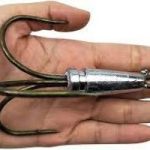By Alex Howard ABC Channel 7
BOCA GRANDE, Fla. —
For many, Southwest Florida is a fishing destination like no other. Between snook, redfish, trout, and countless other species, there’s something for any angler. But above all of them, one fish reigns supreme, and it’s literally known as the silver king.
The tarpon is a prehistoric sportfish, world-renowned for its size and fighting ability when hooked. Every year they come by the thousands to Boca Grande Pass to feed before spawning, but recently, illegal fishing practices have put one of the world’s most famous fish at risk.
From late May through July, a trip out on the water to Boca Grande Pass guarantees seeing fishermen.
“It’s mind-boggling how many boats are out there, and it creates some heated discussions in the middle of the pass in the middle of the day,” said Steve Hutch, a fourth-generation Boca Grande native and fisherman.
The pass holds some of the deepest inshore water in all of southwest Florida, reaching depths of up to 70 feet. It becomes the perfect highway for our area’s favorite sportfish.
“Tarpon come to Boca Grande Pass to gorge themselves on food. It’s one of the two deepest ports on the Gulf Coast. And it contains enough food and room for the tarpon to congregate, build their stamina up, put on their roe and then go offshore and spawn.” Hutch said.
Since they are trying to fatten up before spawning, people use bait like crabs, shrimp and smaller fish. That’s where something called “jigging” becomes a problem. It’s a technique that uses a weighted fishing lure called a jig. Jigging is usually used to trick fish into biting — anglers jerk the lure up and down to mimic an injured baitfish’s erratic swimming style. But anglers who know the waters of Boca Grande say that’s not what’s happening in Boca Grande Pass.
 “They made it a hooking machine, so as we said earlier, people in the west coast and other places snag salmon, and steelheads, they use treble hooks, those were outlawed in Boca Grande. So they designed this hook method for drifting through a large school of tarpon, catching them on the side fins, the gill plate, underneath the jaws, anything protruding.” Hutch said.
“They made it a hooking machine, so as we said earlier, people in the west coast and other places snag salmon, and steelheads, they use treble hooks, those were outlawed in Boca Grande. So they designed this hook method for drifting through a large school of tarpon, catching them on the side fins, the gill plate, underneath the jaws, anything protruding.” Hutch said.
Some local fishermen who asked not to be identified said they’ve recently noticed fishermen, even Charter Captains, in the past, using jigs like this to foul hook Tarpon.
“It’s basically a big chunk of lead that they’ve formed around a big circle hook, with a little curly tail, paddle tail jig on it. It’s meant to get around the law that you can’t have the weight below the hook, which, you can see, it does. If you give it a quick jerk. It’s held on by a rubber band, and the other loophole is the lead doesn’t break away because it’s attached by another piece of line,” they said.
Depending on where it’s hooked, this practice can kill this fish, a protected species in the state of Florida.
“When you hook a fish from the face, you can turn the head and bring him to you. But when you hook one in the side of the tail, they get reeled in backward, and the fight is prolonged.” Hutch said.
While the jig is banned by the state, fishermen in Boca Grande say a lack of enforcement has caused some to ignore the law, leading to dead Tarpon washing up on the beach. Fishermen like Hutch say it needs more enforcement and stronger penalties.
“But it needs to be enforced, and the fines need to be high enough that nobody wants to go into Boca Grande Pass with a jig in their boat or attached to a rod,” Hutch said.
In the hopes that this prehistoric fish will still be around for generations to come.
“Its a catch and release, so its endless how long we can hold them. With water quality and food, they are prehistoric. If they are protected and looked after, my great-great-grandchildren will catch them here in Boca Grande Pass,” Hutch said.
In a statement, FWC said that the penalty for using a prohibited jig in Boca Grande would be a misdemeanor charge if someone was caught with one. They added that the Boca Grande Pass is a high-priority patrol area during the Tarpon run from May through July and that officers are constantly looking for prohibited gear and other boating violations.
